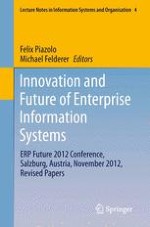2013 | OriginalPaper | Buchkapitel
Critical Success Factors of e-Learning Scenarios for ERP End-User Training
verfasst von : Lukas Paa, Nesrin Ates
Erschienen in: Innovation and Future of Enterprise Information Systems
Verlag: Springer Berlin Heidelberg
Aktivieren Sie unsere intelligente Suche, um passende Fachinhalte oder Patente zu finden.
Wählen Sie Textabschnitte aus um mit Künstlicher Intelligenz passenden Patente zu finden. powered by
Markieren Sie Textabschnitte, um KI-gestützt weitere passende Inhalte zu finden. powered by
